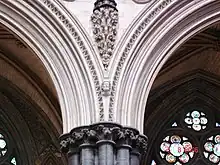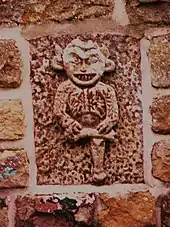

The Lincoln Imp is a grotesque on a wall inside Lincoln Cathedral, England, and it has become the symbol of the city of Lincoln.[1][2] A legend tells of it being a creature sent to the cathedral by Satan, only to be turned into stone by an angel.
Legends
According to a 14th-century legend, two mischievous creatures called imps were sent by Satan to do evil work on Earth. After causing mayhem in Northern England, the two imps headed to Lincoln Cathedral, where they smashed tables and chairs and tripped up the Bishop. When an angel came out of a book of hymns and told them to stop, one of the imps was brave and started throwing rocks at the angel, but the other imp cowered under the broken tables and chairs. The angel turned the first imp to stone, giving the second imp a chance to escape. It is said that even on still days it is always windy around the cathedral, which is the second imp circling the building and looking for his friend.[1][2][3]
There are many variations on Lincoln Imp legends. According to one popular legend, the imp which escaped fled north to Grimsby, where it soon began making trouble. It entered St. James' Church and began repeating its behaviour from Lincoln Cathedral. The angel reappeared and gave the imp's backside a good thrashing before turning it to stone as it had the first imp at Lincoln. The "Grimsby Imp" can still be seen in St James' Church, clinging to its sore bottom. Another legend has the escaped imp turned to stone just outside the cathedral, and sharp-eyed visitors can spot it on a South outside wall.[1][4]
Lincoln College, Oxford
An 1899 reproduction of the Lincoln Imp also overlooked the Front Quad of Lincoln College, Oxford until 2000 when it was transferred to the bar (Deep Hall) and another Imp was erected in the traditional position above the entrance to Hall.

This has given rise to a traditional Oxford expression: 'to look on someone like the Imp looks over Lincoln' as well as giving rise to the title of the college's undergraduate newspaper: The Lincoln Imp. The Lincoln Imp is also the mascot of the college boat club, an image of which is used to decorate the oars and jerseys of the men's 1st VIII.[5]
Wider use of the image

The Lincoln example is by far the best-known example. James Ward Usher, local businessman and philanthropist, obtained sole rights to use the image of the Lincoln Imp on jewellery, in the late 19th century, a venture which contributed greatly to his fame and wealth.[6]
Lincoln City Football Club are nicknamed 'The Imps'.[3] An image of the Lincoln Imp appears on their crest, and 'Poacher the Imp' serves as club mascot. The Lincoln Imp also lends its name to the Gibraltar club Lincoln Red Imps F.C.,[7] and Lincoln Hockey Club share the nickname and crest design of their footballing counterparts.
The Lincoln Imp is the badge of No. LXI Squadron RAF.[8]
See also
References
- 1 2 3 Santos, Cory (19 April 2013). "Tracking the mysterious origins of the Lincoln Imp". The Lincolnite. Archived from the original on 24 May 2013. Retrieved 7 July 2013.
the imp has come to represent Lincoln as its mischievous mascot.
- 1 2 Williams, Phil (16 December 2011). "A History of the Lincoln Imp". Lincoln Cathedral. Archived from the original on 28 May 2012. Retrieved 7 July 2013.
Lincoln's imp is a well known emblem of the Cathedral and the city, to the extent it has been adopted as the symbol of Lincoln
- 1 2 "The Lincoln Imp". Lincolnshire - Unexplained Myths. BBC. Archived from the original on 24 January 2019. Retrieved 7 July 2013.
- ↑ O'Grady, Sean (6 November 2010). "Minor British Institutions: The Lincoln Imp". the Independent. Archived from the original on 14 June 2022. Retrieved 7 July 2013.
- ↑ "The Imp". Lincoln college, Oxford. Archived from the original on 17 September 2016. Retrieved 7 July 2013.
- ↑ "History of the Usher Gallery". The Collection. Archived from the original on 29 October 2013. Retrieved 7 July 2013.
- ↑ "Lincoln city football club". Archived from the original on 23 July 2013. Retrieved 7 July 2013.
- ↑ "The Royal Air Force - History Section". www.raf.mod.uk. Archived from the original on 10 February 2009. Retrieved 10 March 2009.